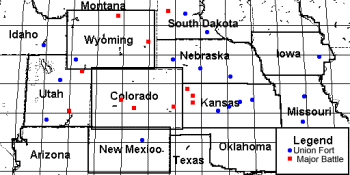The Native American: A History Of Oppression
From Columbus's arrival to America in 1492 up until today,
Native American tribes have been oppressed and cast down by white men. In the 1800's,
their land was invaded and they were forced onto reservations. In the Indian
Wars, many Native Americans were labeled "hostile" and massacred by the
Union Army. Even the reservations and "Indian Territory" was taken over
and settled by the white men, and today, the major tribes that once flourished
over all of North America are all but gone, with only a few small reservations
to live on. ( Grolier Multimedia Encyclopedia 95)
The Trail of Tears, Indian Wars, and other events
occurring in the 1800's show what the Indians were put through, and how
the white man killed them without mercy. The Native Americans were pushed
onto reservations, and they were forced to make treaties which the U.S. government violated
again and again.
The Trail Of Tears
In the 1830's, Native Americans still lived in their native lands for the most
part. However, white men considered them a threat to peace. So, in 1838, the
Federal government had what they called the "Five Civilized Tribes"
removed. These tribes were the Cherokee, Choctaw, Chickasaw, Creek, and
Seminole. They were moved at a forced march up to 800 miles from their
homelands to the "Indian Territory", which is modern-day Oklahoma. Under
cruel conditions, the army forced the peaceful tribes through the cold, winter
weather to their new homes. During this ordeal, known as the "Trail of
Tears", over 4,000 Cherokees alone died, out of the 15,000 moved. They died due to
disease, exposure, and starvation.
Even when the Indian Territory was reached, the US Government was not
satisfied. Slowly, more and more of the land was taken from the Native
American tribes. A government who maintained ideas of equality and
freedom, were showing that these ideas obviously did not pertain to everyone.
In 1902, several hundred thousand acres were cleared out for white
settlements. In 1907, the Indian Nations ceased to exist, and when Oklahoma
became a state, all Native American territory was assimilated into the Union.

The Indian Wars
This series of bloody battles started several years after the end of the Civil
War, due to the demand of Indian territory by the white Americans and
ended with the massacre at Wounded Knee in 1890. Thousands of native
Americans were slaughtered by the cruel Union Army, led by generals such as
Custer, Gabon, and Sherman. The Native Americans, led by heroes such as
Sitting Bull, Chief Joseph, and Crazy Horse, fought outnumbered for many
years before being defeated one by one at the hands of the Federal
Government. They won many battles, such as the Kidder massacre, in which
they killed an entire regiment, with only 2 casualties themselves.
For the most part, however, the Union was a ruthless enemy. They attacked
many harmless villages, and killed many Native Americans in the massacres
of Powder River, Sand Creek, Little Wolf, and Wounded Knee. The Native
Americans were outnumbered and outgunned. By the end of the war, they
had won many battles against the Union Army, but they also lost so many
warriors that they were forced to surrender.
The experiences of the American Indians were a terrible ordeal. As long as the
Constitution and its amendments are in control, the US Government must ensure that this type of thing will never
happen again.
Native Americans On the WWW:
A Complete Listing of Lakota Sioux Links In South Dakota
The Native American Virtual museum
Hudson Valley Network: History and the Native American
Shaun R.
Nick S.
Lane D.
Austin S.
Ambrose, Steven E. Crazy Horse and Custer, Meridian Publishing 1975
Yenne, Bill, North American Indian Tribes, Arch Cape Press 1986
Grolier Mutimedia Encyclopedia, Grolier Electronic Publishing 1995
George Cassutto's Cyberlearning
World
[Lesson Plan of the
Day]
[Cassutto
Memorial] [About
the Author] [Search]
[Civics
Lesson Plans]

